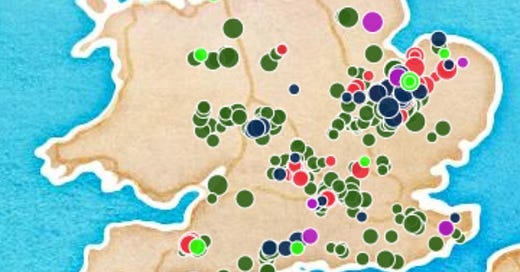Changing values
This week: no religious people have not been barred from public life, don’t be silly. Also, some adverts I really hope they wouldn’t make now; and a map of eel(?) rents(?!?).
Last week, someone asked me to write about Nicola Sturgeon’s resignation as Scottish First minister and leader of the SNP, and what it meant for the rest of the UK. I didn’t have time, which I was quite pleased about, because I hate turning down work but just didn’t feel qualified to comment. I have no idea whether this will mark the beginning of the end of the SNP’s dominance of Scottish politics or what it means for either independence or the Labour party, and frankly think there are quite enough London journalists commenting on this one based entirely on vibes already.
Something I do feel qualified to comment on though – or at least, something I have enough of an addiction to commenting on, after a quarter century online, that you’re just going to have to deal with it, sorry – is the endless intractable row about free speech, liberal bigotry and cancel culture we’ve all been engaged in since some time before the last ice age, and here we go again.
So: potential first minister Kate Forbes, a member of the Free Church of Scotland, has said that, while she claims would make no attempt to row back on such rights now, she would not have voted to create gay marriage, because of her faith. This may well be enough to doom her leadership bid: fellow MSPs are withdrawing their endorsements, and a senior member of her campaign was widely quoted as saying “she has f*cked it”, which is on the whole not the sort of thing you normally want senior members of your leadership campaign to be briefing.
Actually, I’m not sure “f*cked” is the right verb: this wasn’t a political strategy, she believes what she believes, and at least she’s been honest about that. Speaking as someone who does believe firmly in gay rights and equal marriage – and who is minded to agree with furious statements like "It is not remotely troubling to me that someone who would not vote to give me human rights is evidently no longer eligible for public leadership" – I’m glad she didn’t pretend to be someone else just to win an election.
What’s annoying me, though, is the inevitable, nonsensical hysteria about how it is, in fact, the left who are the real bigots. Giles Fraser claimed it showed that “secularism now means a ban on religious people in public life”, which is a hell of a take from a regular on BBC radio’s Thought For the Day, while Forbes’ own church told the Daily Mail: “The fact that she is being criticised for her Christian convictions shows a level of bigotry that has no place in a pluralistic and diverse society”, and yeah, sorry, you don’t get to use those words about your own desire to be publicly intolerant.
This entire argument is, of course, nonsense. You can tell that there’s no bar on religious people in public life, not just from Giles Fraser’s successful broadcast career, but from the fact that Kate Forbes, a religious person, is active in public life, has spent three years as Scotland’s finance secretary, and is a serious contender to become First Minister: if that’s a bar on religious people in public life, then I’m a penguin. What there is a bar on is expecting people who disagree with your political positions to discount the fact, just because they come from faith.
This, not any nonsense about cancel culture and enforced conformity, is the real divide between the two sides on this one. The actual point of contention is not that secularists all want religious people drummed out of public life, any more than religious people all want to bring back government-mandated homophobia. (Some clearly do, but let’s leave that to one side.) The issue is that some people think the fact a view comes from faith should give it a sort of protected status, and rule it out as a reason not to vote for someone.
Well: cobblers. Some people believe in Marxist-Leninism, or conspiracy theories, or the notion that we should dismantle the NHS because some dead Austrian told us we should. Every one of these things is seen, quite rightly, as a perfectly rational reason not to vote for someone. It’s only religious views that expect special status and a slot every morning on Radio 4. To those of us who don’t share them, it’s increasingly hard to see why.1
Map of the week
Tuesday night I received an email from the excellent housing wonk Toby Lloyd. “Saw this and thought of you, for obvious reasons,” it read, followed by a link to this tweet:
Keep reading with a 7-day free trial
Subscribe to The Newsletter of (Not Quite) Everything to keep reading this post and get 7 days of free access to the full post archives.


